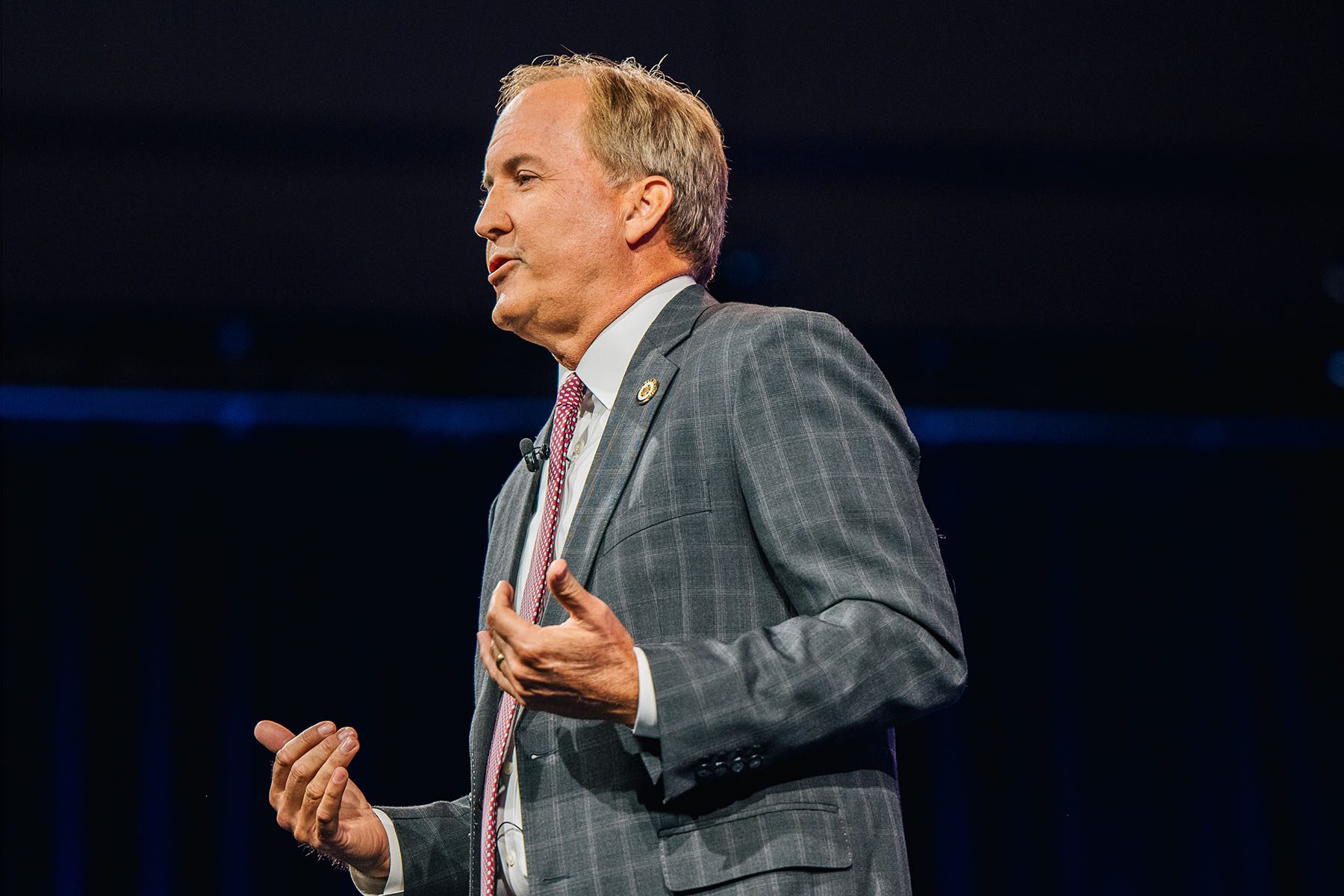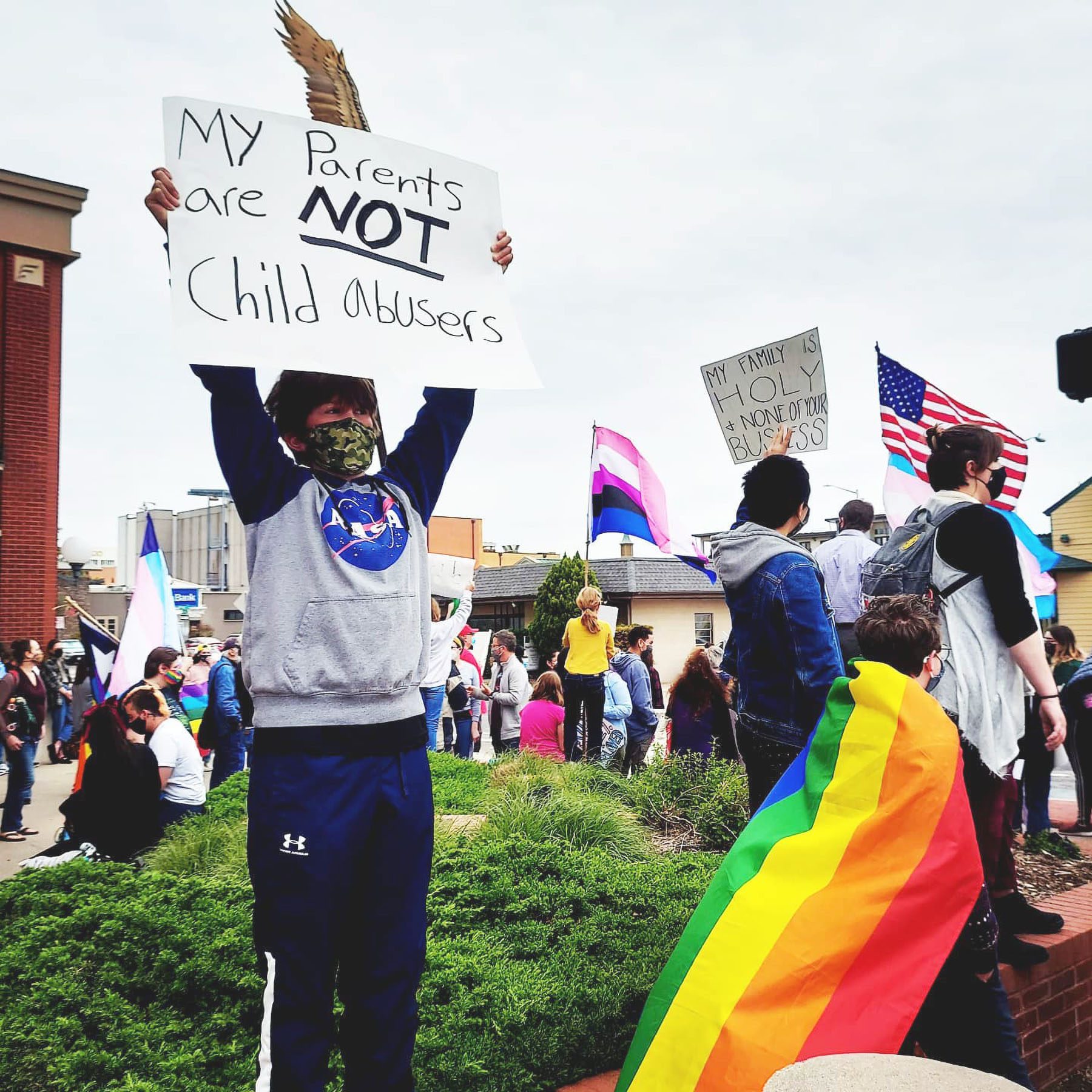When the case worker asked to inspect the house, Amber and Adam Briggle first led her to the kitchen. They opened the cabinets to show they were full of food.
They moved on to the dining room. Every Sunday the Briggles and their two kids, now 14 and 9, sit in those chairs for dinner and talk about gymnastics or their new purple hair. It was around the dining room table where, six years earlier, Attorney General Ken Paxton and his wife, Angela, sat with the Briggle family eating steak kabobs and watermelon. But last month, Paxton issued a nonbinding legal opinion that gender-affirming health care for transgender kids, like the Briggles’ son, constitutes child abuse. Shortly after, Gov. Greg Abbott ordered the Texas Department of Family and Protective Services (DFPS) to investigate the parents of trans kids.
The Dallas-area family now says it is under investigation and at risk of losing the kids.
“When we were notified of the allegations, it was as if the wind had been knocked out of us. We wanted to scream and cry, but we had no air,” the couple wrote in a statement approved by their lawyer. “Raising a transgender child in Texas has been one long political emergency.”
Briggle said she learned of the investigation February 28, when she found a sticky note on her desk at the massage studio she owns saying she had missed an urgent private call. She assumed it was from another parent of a trans kid looking for advice. When she called the number, the woman on the line informed her that she was a Child Protective Services investigator, and she was 30 minutes away from the Briggle home.
The next 30 minutes went by in a blur, Briggle said. She managed to reach Adam, and they got family attorney Ian Pittman on the phone. They convinced the investigator to meet them at Briggle’s office. She would schedule another meeting for that Wednesday at the house.
“We told the children that they have the right to not answer questions,” the couple wrote in a statement. “We told them that the government is trying to spy on us even though we have done nothing wrong.”
When the inspector showed up at their home Wednesday, March 2, They showed the investigator their backyard — gardens and a trampoline. They stopped her at the kids’ bedrooms. Letting this person — a stranger who was investigating them — into the children’s space felt like a violation, they told her. The Briggles had a legal right to stop the investigator and refuse to answer questions, their lawyer had told them.
Before she left, the investigator told them that they were clearly doing something right, Briggle said. But she wondered, would that be enough?
The state had opened investigations into at least five other families, according to Pittman. A Texas state judge issued a restraining blocking the state from investigating at least two families on March 2. The court is slated to consider a wider injunction against the policy on March 11.
On March 2, Health and Human Services (HHS) Secretary Xavier Becerra issued a statement that denying gender-affirming care to trans youth is illegal and the federal government would enforce transgender protections in Texas.
“HHS will take immediate action if needed,” Becerra said in the statement. “I know that many youth and their supportive families are feeling scared and isolated because of these attacks. HHS is closely monitoring the situation in Texas, and will use every tool at our disposal to keep Texans safe.”

Gender-affirming medical care for kids is largely uncontroversial in the medical community. Every major medical association including the American Medical Association, the American Psychological Association and the American Academy of Pediatrics advocates that young people who have gender dysphoria should be connected to gender-affirming care to ease depression, anxiety and suicidality.
Paxton has argued that such care violates Texas law because it will lead to the premature sterilization of young people before they are able to consent. However, for most trans children, gender-affirming care means mental health services or reversible blockers that pause puberty in kids with gender dysphoria until they are old enough to decide if they want to medically transition. Some older trans teens could access hormones or surgery if doctors and mental health providers find it medically necessary.
Texas’ scrutiny of transgender kids comes as states across the nation are passing anti-transgender bills. In the past two years, 11 states have passed laws banning transgender girls from playing sports in their lived gender. Arkansas has also passed a bill preventing youth from accessing gender-affirming medical care.

LGBTQ+ advocates say the move to brand parents of trans kids as child abusers in Texas is political. Paxton, who has been charged with securities fraud, failed to gain enough votes in the Republican primary March 1 and is headed to a runoff election.
It is unclear how the state will proceed with investigations in light of federal guidance that explicitly calls them discriminatory and illegal. A request to the DFPS for comment was not returned. HHS did not respond to a request to comment on its next steps.
In the meantime, families like the Briggles have been working feverishly to secure attorneys who will work pro bono, testimonials from friends and family, and home studies for a “safe folder,” an emergency packet of documents to demonstrate their parenting skills. The Briggles have filed a federal complaint against the state, Adam Briggle said.
“The Texas government has launched an effort to round up transgender children and send them off to a broken, overcrowded, and dysfunctional foster care system,” the Briggles wrote.

Last year, the legislature failed to pass a bill that would have labeled gender-affirming medical care as child abuse. Briggle testified against that bill. The couples say their family has been the subject of death threats and harassment ever since.
The family is terrified of speaking up about the investigation now, they said. But the couple is prepared to flee the state, and they worry that if no parents speak up, other trans kids will also face removal.
Adam is a tenured professor. Briggle owns a business. Both kids have a lot of friends. Leaving Texas would destroy their lives, they said.
“I really think that we need to start a contingency plan of that nature,” Adam said.
“If we have to become political refugees in our own country, then that’s what we do,” Briggle added. “But I don’t know where it’s safe.”






